What’s the Real Cost to Build an App Like Airbnb in 2026?
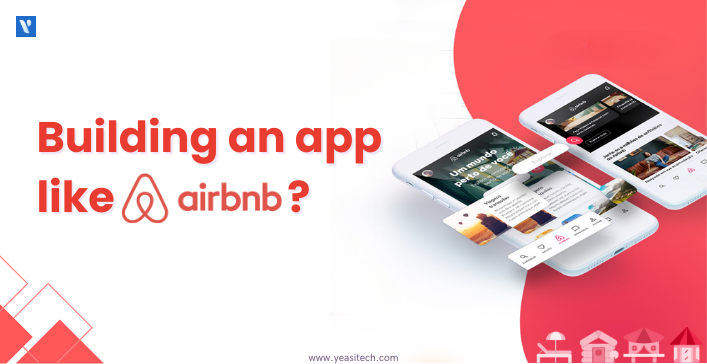
Imagine earning money consistently from your unoccupied room. Or booking a cozy mountain cabin from your phone in just minutes. That’s the magic platforms like Airbnb have brought to the world. And even in 2026, their influence continues to grow.
Creating an app like Airbnb in 2026 is about more than just duplicating a billion-dollar idea; it’s about applying a tried-and-true business plan to address major issues, enter growing markets, and generate scalable revenue streams. They are shaping our way of earning, exploring, and living. Whether you are a real estate agent, startup creator, or an inquisitive businessperson, one question is undoubtedly at the forefront of your mind:
“What’s the real cost of building an app like Airbnb in 2026?”
This blog post explains everything clearly — the costs, main features, market trends, how it’s built, and how you can create your version of Airbnb without spending too much, even if you don’t know much about tech. No worries! The guide uses simple language, useful tips, fun facts, and easy examples to help beginners.
Let’s get started!
Instead of just duplicating a billion-dollar idea, developing an app like Airbnb in 2026 involves applying a tried-and-true business plan to address pressing problems, enter growing markets, and generate scalable revenue streams. Let’s talk about the primary advantages for business owners, startups, and groups like yours.
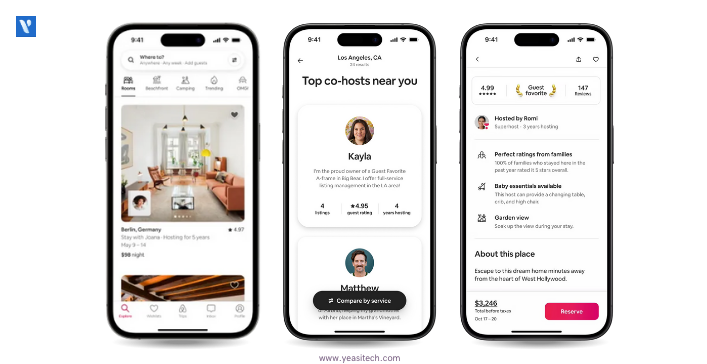
Quick commerce typically refers to speedy delivery and instant service. In the case of Airbnb, it’s all about:
That’s quick commerce applied to travel!
As consumers become more specific in their needs, localized, personalized Airbnb-style apps are gaining serious traction. Think hyperlocal tourism in India, eco-conscious travelers in Europe, or Gen Z-friendly “stay-and-vlog” spaces.
In short: There’s never been a better time to launch your version of Airbnb.
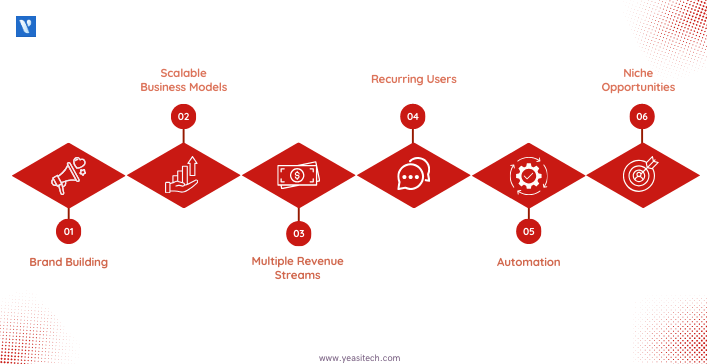
Developing an app similar to Airbnb in 2026 is about using a tested business strategy to solve real-world issues, break into expanding markets, and create scalable revenue streams, not merely copying a billion-dollar concept. Let us discuss the main benefits for entrepreneurs, startups, and companies such as yours.
Once the platform is built, it operates 24/7 and can be scaled across cities, states, or even globally. Unlike hotels or property companies, you don’t need to own any property.
That’s why Airbnb became a $100B company without owning a single room. This is known as a zero-inventory model—it’s lean, profitable, and scalable.
You’re not locked into just one way to earn. With an app like Airbnb, you can generate money through:
Once users love your platform, they stick around.
In 2024, Airbnb reported that more than 85% of bookings came from repeat users.
Modern Airbnb-style platforms use automation to:
This drastically lowers the cost of support staff and helps you scale faster.
If done right, your platform won’t just be a booking tool, it’ll become a community.
Airbnb expanded by enabling hosts and guests to trust strangers through technology.
You don’t have to build the “next Airbnb for the whole world.” You can build:
When developing an app like Airbnb, features are important. They’re more than simply a “nice to have”; they affect trust, create or break the user experience, and ultimately decide whether or not consumers book or bounce. Let’s break it down in a super simple way:
| Feature | Description |
|---|---|
| User Registration/Login | Sign up via email, phone, Google, or Apple |
| Search & Filters | Search by location, date, budget, and type of stay |
| Property Listings | View detailed listings with images, amenities, and rules |
| Instant Booking/Requests | Book instantly or send a booking request |
| In-App Chat | Message hosts before confirming |
| Ratings & Reviews | Read and leave reviews |
| Payments | Integrated payments via UPI, cards, and wallets |
| Wishlists | Sign up via email, phone, Google, or Apple |
| Feature | Description |
|---|---|
| Host Dashboard | Manage bookings, revenue, and reviews |
| Add New Property | Upload photos, add pricing, set availability |
| Booking Calendar | Track dates and occupancy |
| Automated Pricing | Dynamic pricing based on demand |
| Earnings & Payouts | Withdraw to bank/UPI |
| Verification Tools | ID verification, property docs |
| Feature | Description |
|---|---|
| User Management | Manage both hosts and guests |
| Property Moderation | Approve/reject listings |
| Booking Monitoring | Track live booking activity |
| Revenue Dashboard | View income by region, host, etc. |
| Dispute Management | Handle complaints and refunds |
| Analytics | Usage data, customer behavior, and top cities |
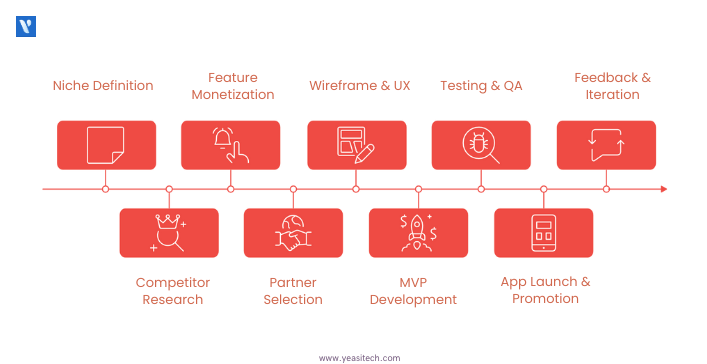
Developing an app like Airbnb may seem difficult, and it is, but with the correct plan, it is a clever and doable process. Here’s a step-by-step breakdown anyone can follow:
Don’t try to clone Airbnb. Find your own distinct angle instead.
Try this:
Example Niches:
Study:
Discover their advantages, disadvantages, and user grievances. Goldmines include resources like G2, Trustpilot, Reddit, and Play Store reviews.
From the features we discussed earlier, choose what fits your budget and goals. Not everything needs to go in the first version (MVP).
Also, decide how you’ll make money:
If you’re not a techie (most founders aren’t), this is crucial. Look for a tech company like YeasiTech that:
Tip: Ask to see past work, tech stack recommendations, and what they’ll use for chat, payments, maps, etc.
Before coding, design a wireframe:
Tools used: Figma, Adobe XD, Sketch
“Design isn’t just how it looks, it’s how it works.” — Steve Jobs
This version should include only core features to launch fast and test your idea. Typical MVP includes:
The MVP helps get real feedback from users before scaling up.
In travel apps, quality control is essential. You should check for:
You’re ready to go live on:
Next, start marketing:
Airbnb was once a simple website renting out 3 air mattresses. It grew through constant iteration and feedback.
| Component | Popular Tech |
|---|---|
| Frontend (Mobile) | React Native, Flutter |
| Backend | Node.js, Django, Laravel |
| Database | PostgreSQL, MongoDB |
| Payments | Stripe, Razorpay, PayPal |
| Maps & Location | Google Maps API |
| Chat | Firebase, Twilio |
| Hosting | AWS, DigitalOcean |
| Analytics | Mixpanel, Firebase Analytics |
Let’s break down the actual budget—especially for Indian entrepreneurs in 2026.
| Component | Estimated Range |
|---|---|
| Research & Wireframes | ₹30,000 – ₹50,000 |
| UI/UX Design | ₹30,000 – ₹1,20,000 |
| Frontend App (Flutter) | ₹,50,000 – ₹1,00,000 |
| Backend + APIs | ₹50,000 – ₹1,00,000 |
| Admin Panel | ₹80,000 – ₹1,00,000 |
| Payment, Maps, Chat Integration | ₹50,000 – ₹1,00,000 |
| QA Testing | ₹40,000 – ₹90,000 |
| Cloud & Deployment | ₹30,000 – ₹80,000 |
| Maintenance (Monthly) | ₹20,000 – ₹60,000 |
YeasiTech offers full MVP development at affordable prices for ready-to-scale, secure, and beautifully designed vacation rental apps.

| Factor | Impact |
|---|---|
| Platform | Android-only is cheaper; iOS + Web adds 30–50% more |
| Design | Custom animations and transitions cost more |
| Backend Logic | Real-time booking engine increases dev time |
| Third-Party Tools | Paid APIs (Mapbox, Stripe, chat tools) |
| Security & Compliance | Data encryption, GDPR compliance if international |
| Team Location | Indian developers cost 4–6x less than US teams |
| Post-Launch Support | You’ll need updates, patches, and bug fixes regularly |
| Factor | How It Affects Cost |
|---|---|
| Features | More features = higher cost |
| Design Complexity | Custom UI = more time = more budget |
| Platforms | Android only is cheaper than Android + iOS + Web |
| Backend Infrastructure | Real-time data needs stronger servers |
| Payment Integrations | More payment gateways = more testing |
| Team Size & Location | Indian devs cost less than US/Europe |
| Post-launch Support | Ongoing maintenance adds to the total cost |
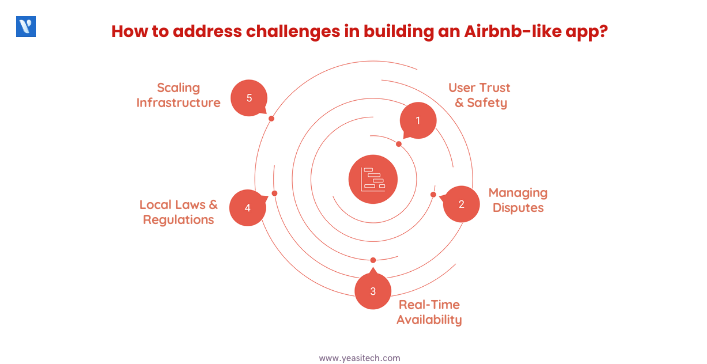
It takes more than simply attractive panels and buttons to create an app like Airbnb; it also requires addressing some very serious operational, technological, and user-centric issues. The following are the main obstacles that most companies encounter (as well as solutions):
Solution:
Solution:
Solution:
Solution:
Solution:
At YeasiTech, we’ve built marketplaces like Airbnb with proven success. One notable example is LuckyBackyards — the first backyard booking platform.
LuckyBackyards connects homeowners with people seeking outdoor spaces for yoga, parties, pets, or relaxation. Features include:
The results speak for themselves: 4,200+ bookings in the first 2 months and 72% repeat guests in month one.
You can explore the full LuckyBackyards case study here to learn about the journey, technical solutions, and real-world impact.
Absolutely. With travel demand rising and Airbnb’s model proving profitable, there’s a huge opportunity for new players—especially in niche markets.
Building an Airbnb-like app in 2026 is doable, affordable, and potentially highly profitable—if done smartly. You don’t need to break the bank. You just need the right team, clear goals, and a smart launch strategy.
At YeasiTech, we help startups and founders like you build scalable, beautiful, and affordable apps from scratch—whether you want a simple MVP or a full-fledged Airbnb competitor.
Let’s Talk → Contact Us
Or Schedule a Free 30-Min Strategy Call
Let’s bring your app idea to life—on time and within budget.
Key features include user registration, property listings, search & filters, booking & payments, in-app chat, host dashboard, booking calendar, reviews & ratings, and an admin panel to manage users and revenue.
For a basic MVP, development usually takes 3–5 months. A full-featured app with advanced features, multiple platforms, and integrations may take 6–12 months, depending on the team and complexity.
You can minimize costs by starting with an MVP, using no-code/low-code platforms, outsourcing to affordable yet skilled teams, reusing open-source templates, and keeping the UI simple and functional.
YeasiTech is a trusted IT service partner with 8+ years of experience, empowering 250+ businesses with scalable web, mobile and AI solutions.
Explore related topics to broaden your understanding and gain actionable insights that can transform your strategies.